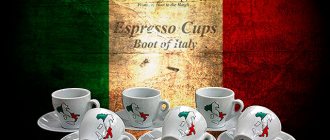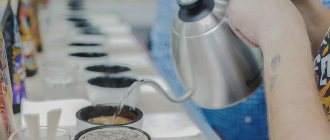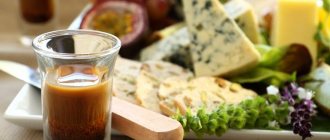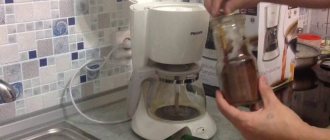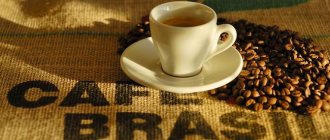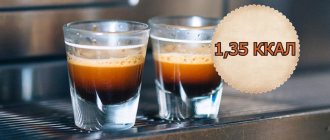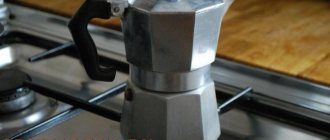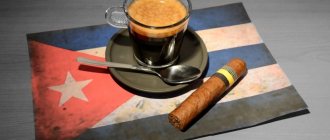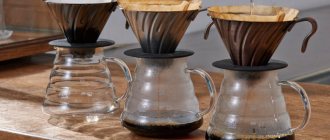Paper filters are the most common types of filters for drip coffee makers and more. They have two undeniable advantages - ease of use, in which there is no need to wash anything - after preparing the drink, the bag is simply thrown away, and the quality of filtration - you can even add powdered grinding, and it will be filtered efficiently. We'll tell you all about paper coffee filters - how to choose, how they differ, and whether you can make them yourself.
Bleached filters
What are bleached filters? Essentially, it is paper that has gone through a bleaching process. Natural paper is not actually white (for comparison, think of cheap paper bags in stores). The following products are used in the whitening process:
- Chlorine.
- Oxygen.
Chlorine is a substance that is used to clean swimming pools and is very often used to bleach filters. However, products that are bleached with oxygen are considered to be of higher quality. If you are looking for a high-quality bleached filter, then you might want to look at products that use oxygen for bleaching.
Coffee filters Mr. Coffee Basket, 8-12 cups, white paper, 8 inches, boxes of 50. (pack of 12 pcs.)
Approximate cost: $21.01
Unfortunately, bleached filters are not good for the environment. Firstly, this is an additional process during production and unnecessary costs. Second, products containing bleach can pollute the environment when disposed of, even though they contain only a small amount of chlorine. Therefore, products bleached with oxygen are more environmentally friendly. Oxygen is much more beneficial to the environment, unlike chlorine.
How to brew coffee in a funnel
The brewing procedure is quite simple, but there are a number of important nuances.
This brewing method is very sensitive to the freshness of the coffee. If you take stale beans (more than 3 months from roasting) for preparation, you will probably just pour the coffee down the sink. But fresh coffee will show itself in all the splendor of its taste.
So: 8 grams of light roast coffee for every 100 ml of water. Total cooking time: 7-8 minutes.
- The best temperature for brewing coffee is 95°C, it will be in the kettle about a minute after it stops boiling.
- Insert the filter and wet it generously with hot water. Pour out this water so as not to get a papery taste in your coffee.
- Pour ground coffee into the filter and smooth the layer.
- Gently pour in a little water (about 50 ml) to “wake up” the coffee. Wait 50 seconds.
- Spill the water in a diverging spiral. Maintain the same level of water in the filter so that the coffee brewing temperature remains constant.
Ready! The result should be almost transparent, rich burgundy coffee with bright flavor nuances.
Unbleached filters
Unbleached filters look dull and are not white. But they are natural and safe for the environment. All paper is initially brown, so it must be further bleached if necessary. Unbleached filters do not go through this process. As they decompose, the remaining chemicals return to the soil without causing any harm to it, unlike bleaching agents such as chlorine.
Quantum Positive - Unbleached Coffee Filters, 100% Biodegradable, Natural Brown Filters, 12 Mugs
Approximate cost: $18.98
There are some features you need to be aware of before you start using unbleached filters. If you simply put an unbleached filter in your coffee machine, your drink may taste papery. Fortunately, it is very easy to prevent this situation with these simple steps:
- Place the filter in the coffee machine.
- Pour in a little water to wet it completely.
- Discard the water that was used to wet the filter and start brewing coffee.
Doing these extra steps will eliminate the papery taste in your coffee. It will even be difficult to determine whether the drink was made using an unbleached or bleached filter.
When will it be ready?
- Americano is a drink that takes literally a minute to prepare: grind the grain, make espresso, add water and enjoy! True, if you order an Americano at a coffee shop, sometimes you have to wait until the barista prepares five large cappuccinos to go before you order...
- Filter coffee is ready! And this is another advantage: you can simply pour coffee from a drip coffee maker into a cup, it will take ten seconds. Of course, you need to brew it first, and this will take about five to seven minutes (a couple of minutes to grind the coffee and add water, and a few more moments to get the finished drink). But you will get 4-8 servings of the drink at once, depending on the volume for which the coffee maker is designed.
Main quality
Natural and bleached filters have little effect on the taste of coffee. However, the quality of the purchased products may have an impact. When choosing filters, you should not try to save money. A difference of a few rubles can significantly affect the taste of the drink.
When choosing a product, you should pay attention not only to the size needed for your favorite coffee preparation method, but also to the thickness. Thin filters allow water to pass through faster. This will definitely affect the coffee brewing process, and not in the best way. The thicker the filter, the more expensive it is. However, the difference in prices is so small that it should be neglected. After all, isn't that so important?
Common problems when using homemade filters
Home-made filters cannot completely replace professional ones. With regular use, you may encounter some difficulties:
- the fibers of fabric models become more porous when reused. They absorb more oils, and the drink loses its strength and aroma;
- if textiles are washed using soap or powder, the taste of the coffee deteriorates;
- When using new gauze or bandage, an unpleasant medical aftertaste may occur in the finished drink.
Homemade filter elements are not recommended for permanent use.
A little about prices
Now you know why quality is so important and understand that when you buy bleached or unbleached filters, you are actually choosing a color. Now it’s worth talking about the cost of products. Unbleached filters go through fewer processes during production, but for some reason they are more expensive than bleached ones.
If you want to save money, then it is better to buy oxygen bleached filters. They are slightly thicker than other cheap alternatives. Of course, if you do not want to harm the environment, it is still better to choose unbleached products. Just remember that you will have to pay a little more for them.
How to wash a reusable coffee filter?
In most cases, it is enough to shake out the grounds and rinse the filter well under running water. You may need to use a brush or brush if there are places where the grounds get clogged. As a rule, all product options (except fabric ones) can be washed in the dishwasher; fabric ones can be washed in the washing machine.
To get rid of unpleasant odors and bacteria, you can use lemon juice, soda, or detergents, but after using them you need to rinse the part thoroughly. It is not advisable to wash fabric ones with powder; you can choose natural products or wash them simply with water.
So which is better?
In fact, there are too few differences between bleached and unbleached filters. Of course, bleached products go through an additional process in production, so they contain some kind of bleach. But none of the types of filters affect the taste of coffee. Unbleached filters are almost always safer for the environment. If you are concerned about the state of Mother Earth, then you should buy natural filters.
Whatever you choose, always buy high quality products. This will definitely affect the taste of the final drink. But the level of bleaching does not play any role at all. Simply choose the size and thickness you need so you can enjoy a great cup of your favorite drink every time.
In the world of coffee lovers, there is a lot of controversy about these simple products - filters. Should I use a paper or metal filter? The disagreement on this issue has been going on for many years, and it looks like it will continue for just as long.
But which filters make the best coffee? Of course, a lot depends on subjective perception. After all, the best coffee isn't always what it's cracked up to be. To help resolve this debate, let's look at the different types of filters and try to choose the best one.
DIY coffee makers?
Fabric coffee filters are rare in Russia, but they are widely used because they are easy to make at home, on your own.
On average, when working by hand, it takes up to 10 minutes to create one product; if you have a sewing machine, it takes even faster. The material used is natural fabrics - linen, cotton, muslin, preferably unbleached. To make your own coffee filter, take a disposable paper filter that fits your coffee maker, unroll it, and transfer the unroll onto the fabric, using seam allowances. Sew by analogy with paper. The edges need not be processed.
Fabric filters should be washed after each use. Therefore, it is better to make several at once, at least 2 pieces, and possibly more. The fabric turns brown over time. You can even wash it in a machine, but without the use of synthetic detergents, fragrances, or conditioner, so coffee filters cannot be placed in a regular batch of laundry items. Flavorings will add an extraneous aroma and taste to the drink, and besides, drinking coffee with residual detergents is not healthy.
On average, one fabric filter lasts for 3-6 months, depending on how many cups of your favorite drink you make.
Please note: the pores in natural fabric are wider than those in paper, so there will be some amount of grounds in the drink. But this is the most environmentally friendly material.
Paper and metal coffee filters
Maybe you're having a hard time deciding which filters to use. We'll answer a few questions about them. Ultimately, you will be able to determine what suits you best.
Which coffee filters are more expensive?
Metal filters are much more expensive than paper filters. This fact will not surprise anyone. Packaging paper products is cheaper, but you need to constantly buy more of them. If you drink coffee in large quantities, you will have to buy them very often. Overall, you will save more in the long run if you buy a metal filter.
What about the environment?
We should all care about the environment and do what we can to reduce our negative impact on the world. Metal filters obviously win here. Of course, you can recycle old coffee and make it into compost, but how many people are willing to do that? Don't worry, most of us don't have time for this. If you care about the environment, then a metal filter is the ideal option.
Universal Gold Coffee Filter (6–12 mugs)
Approximate cost: $17.96
Which filter is easier to clean?
The answer to this question depends on personal opinion. They say that paper filters are much easier to clean compared to metal ones. In the case of a paper product, you just need to pull it out and throw it away. The metal filter must be emptied and then rinsed after each use. In addition, it should be rinsed periodically in the sink or dishwasher to ensure it is always clean and ready for use.
Which filter is best for you?
Coffee can affect health in many ways, and not always in a positive way. Coffee contains cafestol, an oil that increases cholesterol levels. When using paper filters, some cafestol is removed from the coffee. Because of this, many experts believe that paper products are the best option for those who are concerned about their health.
However, these bright white paper filters did not become so on their own. They are bleached with a chemical called dioxin. Despite the lack of substantial evidence, many experts are concerned that bleach may leach into coffee when using these filters. If you use metal products, you won't have to worry about the bleach getting into your body.
However, there is another option. You can always switch to natural paper filters. They do not contain dioxin, but still filter out cafestol. This is the best option if you are concerned about your health.
Does the type of coffee filter affect the taste of the drink?
Perhaps nothing else matters to you if your coffee tastes bad. Right? Paper and metal filters produce different tasting drinks. This is what can help you make your choice.
Since metal filters do not remove large amounts of cafestol from the drink, the oils remain in the coffee. Its taste becomes more pronounced and rich compared to a drink prepared using paper filters. If you like coffee with a strong taste, then you should choose a metal filter.
Paper products, on the other hand, filter coffee better. The result is a drink with a much brighter taste, while it has much less impact on the body. Many coffee lovers prefer this taste.
However, with paper filters there are a few things to consider. They can cause coffee to taste papery. To prevent this, you should first rinse the filter with hot water. True, this takes extra time.
So, if you like your coffee with a rich flavor or don't care about what gets left behind in your drink, then go for a metal filter. If you like a lighter and brighter taste, opt for paper products.
Which filter to choose: paper, fabric, metal or nylon?
To determine the key characteristics of the most popular coffee filters, experts conducted a test using V-shaped filters made from paper (bleached and unbleached), fabric (cotton and linen), metal and nylon.
flax filter
As a result of the test, they suggested choosing such a coffee filter, taking into account your priorities and preferences:
Taste comes first: bleached paper.
Strength comes first: nylon and cotton, some bleached paper filters too.
Eco-friendliness comes first: no single use required and less material required -> fabric, metal and nylon (and since nylon is a plastic, you might want to consider fabric first and then metal).
metal filter
Simplicity comes first: fewer tools required, less cleaning, less shopping -> metal and nylon.
Cost comes first: the more you cook, the more you save -> fabric, metal and nylon.
The disadvantage of metal and nylon filters is that they allow small particles and suspensions of ground coffee to pass through. The drink is neither clean nor transparent.
nylon filter
Coffee preparation method used
If you do not use a metal filter, all this debate is just one theory for you. Some coffee machines already come with a filter. You can also order it instead of using paper filters. Of course, sometimes metal products are not suitable at all for certain cooking methods. This applies, for example, to pour-over systems. If you want to purchase a metal filter, you will have to consult the manufacturer. If they don't have one, it's worth purchasing a new coffee machine.
The debate about which filters are better – paper or metal – has existed for a long time. As you can see, there is a noticeable difference between these types. In addition, they produce different types of coffee. Both types of filters bring something unique to the world of this drink. Which filter you choose depends primarily on your tastes. We recommend that you try both types and then choose the one you like best. After all, that's what's important here, isn't it?
Good luck!
Where does this name come from?
- Filter coffee is prepared in a drip coffee maker for several cups at once. It got its name from the method of preparation: a paper filter with ground coffee is placed in a vessel, through which hot water seeps. In the menu of coffee shops you can also find the names “batch brew” (from the English batch brew - a “batch” of coffee brewed at one time), “regular” (“regular”), “black” (everything seems to be clear here).
- Americano is espresso diluted with hot water. Italian baristas invented this drink during World War II for American soldiers so that they could get a large cup of black coffee, which they were accustomed to at home. At first it was a disparaging name for a drink that was strange to Italian tastes, but later Americano took its place in the classic coffee menu.

